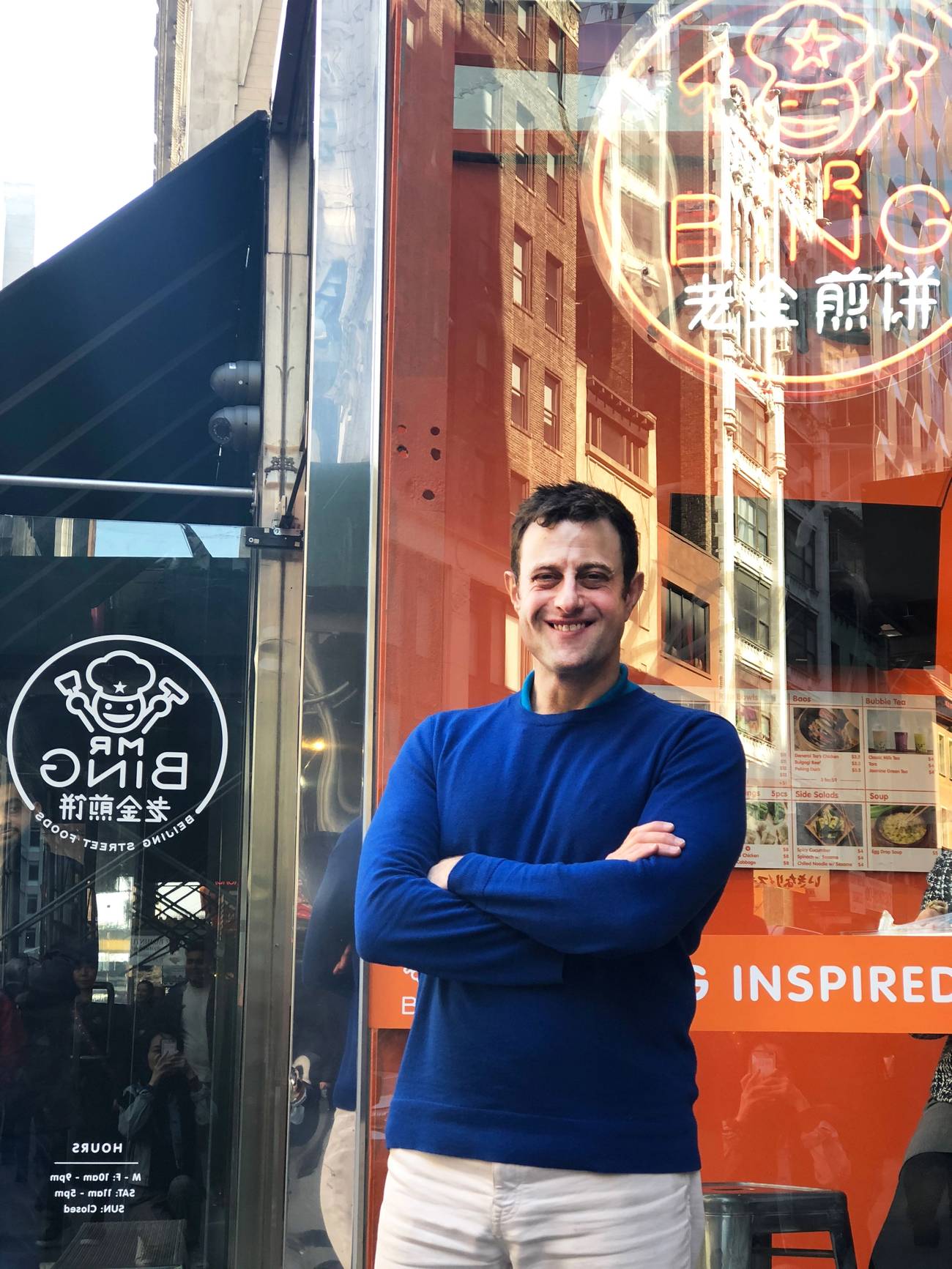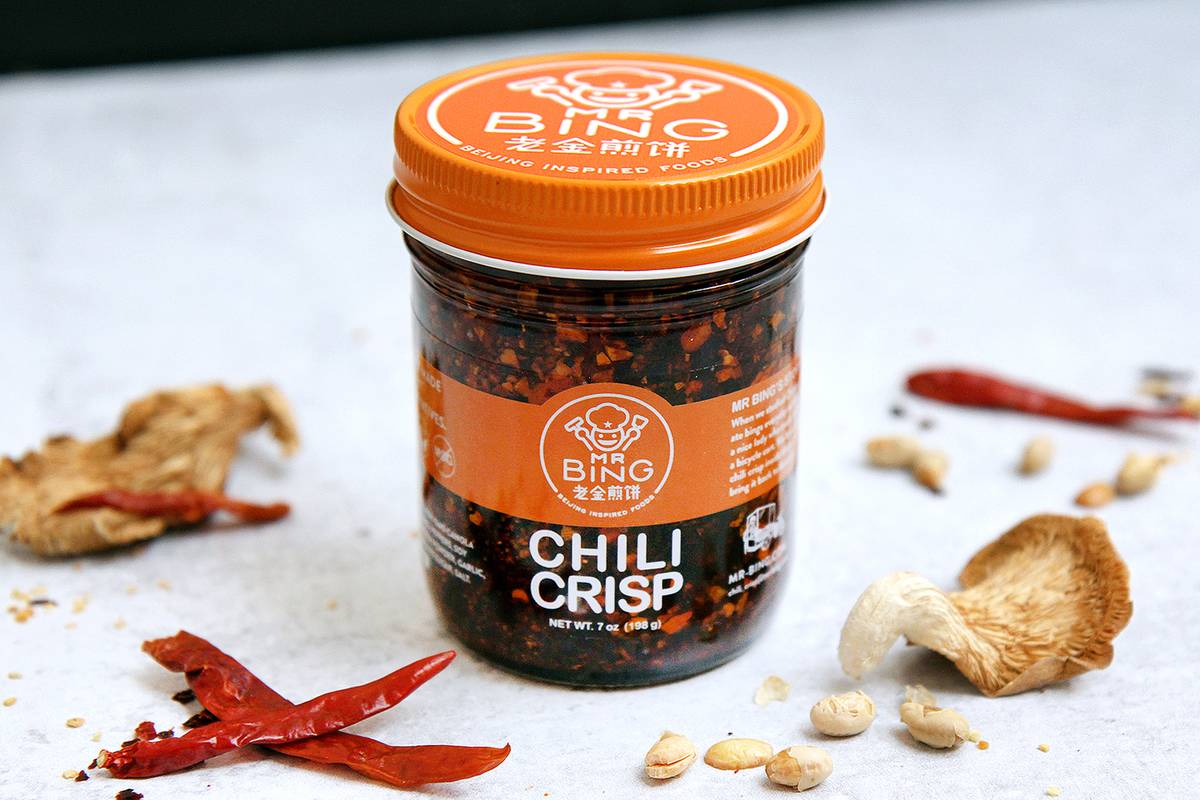Mister Crisp
The unlikely face of a popular Szechuan condiment




When the pandemic turned our culinary lives inward—as the closure of restaurants and the necessity of home cooking made the pantry the most happening place in the house—a few condiments emerged as nationwide favorites. One stood above all: chili crisp, a familiar flavor for anyone with Szechuan roots, and a thrilling, if belated, discovery for everyone else. For one Jewish New Yorker, this proved serendipitous. Brian Goldberg, the co-founder of the wildly successful Mr. Bing’s Chili Crisp, was just rebooting from his restaurant chain to focus entirely on the crunchy, garlicky condiment when it suddenly became a national obsession.
Chili crisp—a mix of chili pepper flakes, garlic, spices, and oftentimes MSG, submerged in oil and sold in a jar—surfaced on the radar of most American consumers and food publications around 2018, and by 2020 had reached cult status. Most competitors—such as Lao Gan Ma, the brand that started it all, or the 2018-founded Fly By Jing—are either made in China or owned by Chinese Americans; Goldberg is an unlikely face behind his brand. But then, he’s used to being unlikely.

In 2002, Spring Valley, New York-born Goldberg came close to representing Israel in the Salt Lake City Winter Olympics as a luger, but was denied a spot after Israel changed its policies toward participants. In 2003, he found himself reporting on sports, in Mandarin and English, for a Singaporean TV station; he’d learned Mandarin at Brandeis University, where he earned an undergraduate degree in Chinese studies, practiced it during exchange trips to Harbin and Beijing, and perfected it in the master’s program in East Asia regional studies at Columbia University. Later on, after a long stint as a stock trader in Hong Kong and Taiwan, Goldberg got inspired by his favorite Chinese street food and opened Mr. Bing, a chain of fast-casual spots serving jianbing, savory Chinese breakfast pancakes—first in Hong Kong and eventually, in 2016, in New York City.
Starting with pop-ups and serving stations all over town, Mr. Bing expanded to six locations in the city, but the chain experienced difficulties and filed for bankruptcy in April 2020. Goldberg and his co-founder, Benjamin Duvall—they met while studying in Beijing in the 1990s—had already begun to change course again: to market the chili crisp that was served at the restaurants as a stand-alone product.
“In 2019, we were developing a Whole Foods-compliant chili crisp to start a kiosk inside the stores,” said Goldberg. The acquisition of Whole Foods by Amazon put a stop to the process, but their product—a reworked, MSG-free chili crisp—remained. It made sense to start selling it directly to customers and to other restaurants that had expressed interest in the condiment.

Last year was exceptionally good for the new business: Mr. Bing’s Chili Crisp got attention from media outlets, and repeatedly sold out on Amazon and grossed nearly $300,000 in sales in 2020. “I had a hunch chili crisp would become a huge hit in America, as Lao Gan Ma was already growing fast, and sriracha had become huge already,” Goldberg said. In May, the brand is launching mild and spicy versions of the original chili crisp, as well as a spice rub and chili oil.
Occasionally, people are surprised when they find out there’s a Jewish white guy behind their favorite Chinese condiment—but sometimes they’re not. At the question of appropriation versus admiration, Goldberg doesn’t flinch. He has lived in Asia for almost half of his life. His heart is in it. He gets sentimental: “There’s some kind of connection between the Jewish people and the Chinese people,” said Goldberg. “There are a lot of documentaries and history around it. It’s the fact that there’s a large diaspora of both Chinese and Jewish people all over the world, and they bring their culture with them. It’s also the family values, cultural values. Then, if you grow up Jewish in New York, you eat a lot of Chinese food.” Especially at Christmas.
But it’s really no surprise that Goldberg ended up in this business. In college, he earned the apt nickname “condiment boy,” because of his obsession with sauces and spreads. “I would bring a shower basket you’re supposed to use for shampoo to the student dining hall, to supplement the relatively sparse selection they had,” Goldberg explained. Now, at age 43, he has the business to fit his nickname.
Flora Tsapovsky is a San Francisco-based food and culture writer.